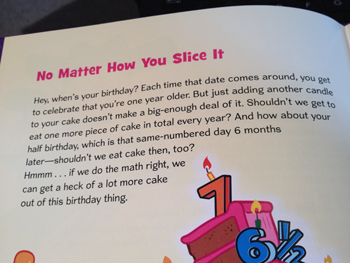Don’t let math stress you out
Research shows how to overcome math anxiety

Plenty of people get nervous taking a test, but some suffer from math anxiety. The good news is that there are ways to overcome it.
Antonio_Diaz/iStockphoto
By Evelyn Lamb
As your teacher passes out the math test, your palms turn sweaty. You notice that your heart has begun to race. Glancing down at the page, you suddenly forget those operations on which you had drilled only a few days earlier. Do you perform all additions first in a complex calculation, or all multiplications? What’s the multiplication table again for 9’s? Oh, you know it — well you’re pretty sure, right? Suddenly, you start to doubt a lot of things that you “know.”
If that sounds familiar, you might suffer from math anxiety.
Or maybe not. Even researchers who study this condition note that it can be surprisingly hard to define math anxiety. It’s also hard to identify precisely how many people suffer from it. After all, it’s not an officially recognized mental disorder in the way that depression or schizophrenia is.
To diagnose math anxiety, researchers administer a questionnaire. It asks things like: “How anxious would you feel about being given a set of division problems to solve on paper?” Some people will rate their reactions as being very panicky. Others have no stress — even if they know they aren’t numerical wizards. So how anxious someone feels tends to fall along a spectrum.
Those who score high on these surveys about stress over making numerical calculations will be labeled math anxious. The exact share who get this diagnosis, however, will vary, depending on where researchers choose to draw the line at what counts as high.
In general, people who panic over their math skills tend to do worse in math classes than do people who don’t mind numbers. But that’s not always true. “Just because you’re math anxious, that doesn’t always mean you’re bad at math,” notes Rose Vukovic. She’s an educational psychologist at the University of Minnesota in Minneapolis.
Math anxiety affects people of all ages. It can lead to poor performance in math classes. And its impacts don’t end at graduation. Throughout life, this type of stress can stand in the way of mastering skills or projects in a host of areas that rely on computations.
But the good news is that the problem is manageable. Researchers are finding ways people can cope with this stress — maybe even to the point of making numbers their friends.
What is math anxiety?
People often think of math anxiety as a problem in middle- and high-school students. But by age 12, kids already will have had many opportunities for bad experiences with math. So panicking over working with numbers may start much earlier. Math anxiety has emerged in some as early as first grade, Vukovic points out.
Understanding the issue can be a kind of chicken-and-egg problem, however. Does math anxiety cause low performance, or do skill problems trigger the stress? The two probably feed on each other, Vukovic says. Indeed, she argues, if low math knowledge were the only issue, building up those skills should erase the problem. Instead, research shows, simply dealing with the anxiety can improve math performance. That suggests that anxiety alone can sabotage math performance, regardless of someone’s skills.
Anxiety, it turns out, can interfere with the brain’s “working memory.” This type of memory allows the mind to hold onto several different pieces of information at once. Mark Ashcraft is a psychologist at the University of Nevada, Las Vegas. There, he studies the role of anxiety in math cognition — how people mentally learn and do math. “When you are math anxious,” he finds, “anxiety steals away working-memory resources.”
As if theft of working memory isn’t bad enough, math anxiety also can hurt, literally. Ian Lyons is a psychologist at Georgetown University in Washington, D.C. Sian Beilock is a psychologist at the University of Chicago in Illinois. Four years ago, when Lyons was Beilock’s student at the University of Chicago, the two conducted a study that looked at people’s brains when they thought about doing a math problem.
In people with high math anxiety, just anticipating doing math turned on areas in the brain associated with pain. In other words, math anxiety can hurt! Interestingly, they did not find the same response when people were actually doing the math. It was the worrying about doing math that was the problem.
Why is math different?
Many issues can trigger anxiety. It might be the anticipation of moving to a new city, of confronting some bully or of remembering your lines on stage during the performance of a play in front of an auditorium full of strangers. But even among academic subjects, researchers note, when it comes to anxiety, math seems special.
You don’t hear people saying they have “chemistry anxiety” or “social studies anxiety.” Likewise, people sometimes say they’re bad at math almost as a badge of honor. In contrast, no one would be proud of the fact that they were bad at reading!

One difference may be mindset. Many people believe mathematical abilities are fixed. You’re either a “math person” or you aren’t. People who think this way take difficulty in math as a sign that they are just not cut out for it. Closely related to this “fixed mindset” is the genius myth. That belief holds that someone must be extremely gifted to do well at math. Together, these attitudes make people think that if math makes them struggle, it must be because they’re just not a math person. So they might as well give up.
Many education researchers instead argue that a “growth mindset” is better. This idea holds that with enough effort, skill in any area can be learned. Someone with a growth mindset sees failure as an opportunity for learning. Someone with a fixed mindset sees it as a setback.
Research suggests that students with a growth mindset learn more and get higher grades than those with a fixed mindset.
One way to think about it is to compare math to music or sports. You don’t expect to sit down at a piano and immediately be able to play a Beethoven sonata. Similarly, no one would expect to make a three-point shot in basketball the first time they stepped onto a court. Sure, some people learn these things more easily than others. Still, with practice, anyone can keep getting better at piano or basketball. And even if you never become a famous musician or athlete, you can still enjoy playing music and sports throughout life. This holds true for math, as well.
How to manage the stress
Math computations are an important element in many careers in science, technology, engineering and math, also known as STEM. So stress over math can serve as a barrier to students who want to become scientists or engineers. Beyond that, math is used in many everyday activities, from cooking to shopping. And math anxiety is just plain unpleasant. (Remember that pain-area activation in the brain?)
So if you stress out over math, what should you do?
The main thing seems to be to separate that stress from your thoughts about math. Ashcraft at the University of Nevada recommends compartmentalizing it. “I try to encourage people to think about setting the anxiety aside,” he says. “Engage in the worry later.”

And a little math anxiety doesn’t have to be a bad thing, says Lyons at Georgetown. He compares it to public speaking. Many people get anxious before giving a speech or performing. It’s called stage fright. “You can respond to that positively and use that,” he says, “or you can go the other way.” In other words, you can either “psych yourself up” or “freak yourself out.” At issue is whether you can see that stress as a positive challenge to overcome — and then devise a game plan to succeed.
Because of the effect stress has on working memory, taking a test is more difficult if you have math anxiety. So, Lyons says, “There are two tasks you have to do: the math and working through the anxiety.” Tackling each task separately could help, science suggests.
Researchers did an experiment to see if separating them helped students with math anxiety. They split the students into two groups. One group did expressive writing about their math anxiety for seven minutes. They would write down their thoughts and feelings related to the looming test. The other group just sat quietly. Then each student took the math test. Those with high math anxiety scored significantly better on the test if they had been in the expressive writing group than if they had just sat quietly.
Expressive writing allows people to work through their anxiety, researchers now think. It allows people to deal with their emotions before an exam so that they can gain that working memory back. Now they could better focus on the math while taking a test.
What can parents and teachers do?
Adults sometimes have a tough time defusing kids’ stress over math. One reason: The older generation itself may suffer from math anxiety — and pass its stress along to those students. But there is some encouraging research that points out ways to help kids grow up thinking of math as fun.

One study focused on an app. Many families make a routine of reading or telling bedtime stories at night. Why not instead play Bedtime Math?
“This is a free app that allows kids and parents to work through math in a structured and fun way,” says Beilock. She was one of the researchers who studied the effect of this app on a diverse group of first graders.
The idea of this app is to get parents and kids talking about math outside of homework time. Instead of focusing on problems that have a right or wrong answer, families can talk about math in a lower-pressure fashion. For example, one prompt goes like this:
Whipped cream was invented about 500 years ago and is credited to a bunch of guys with long, unpronounceable Italian and French names. But what made them think to whip up cream in the first place? Did they know what would happen? Never mind that there was no electricity back then — they had to whip it by hand. Luckily, it was worth the effort.
Whipping air bubbles into cream makes it take up a lot more “volume,” or space.
In the Bedtime Learning Together test kitchen, 1 cup of heavy cream generated 3 cups of whipped cream. With something as important as dessert, that’s a key fact.
The prompt then asks questions for children of different ages:
“If you can whip 2 cups of heavy cream into 6 cups of whipped cream, how many cups of air did you whip into it?”
Or
“If when no one’s looking you slurp up 9 cups of the whipped cream, how much heavy cream did it take to make that?”
Youngsters whose families used the app had bigger gains in math achievement over the course of a school year than did the kids whose families didn’t. This was especially true, the researchers found, for kids whose parents themselves were stressed by math. (The study was funded by the foundation that created the app.)
Parents and teachers need to be especially careful when working with girls. A recent study found that in developed countries such as the United States, girls tend to have more math anxiety than do boys. In lesser-developed countries, the gap between genders is lower. That suggests gender differences in math anxiety may stem from cultural messages, not biology. Another, earlier study suggested that female teachers with math anxiety can unintentionally pass that anxiety on to girls in their classes.
Just being aware of these potential problems can help parents and teachers make sure they do not send unintended messages to children.
It’s never too late
One common problem with math anxiety is that affected students take fewer math courses and avoid majors and careers that use math. But that’s not true for everyone. Virginie Charette changed schools in the middle of ninth grade. And the first math test she took at the new school didn’t go well. She just bombed. “It wiped out every thought I had that I was good at math,” she recalls. Her confidence in math plummeted. For a while she even hated the subject.

Later, in college, she became friends with a math major. He started sharing math puzzles with her. And they proved fun. In fact, they actually kindled “a very emotional attachment,” she says. What’s more, she soon realized: “I had the calling.”
She is now a mathematician at the University of Sherbrooke in Quebec, Canada. As someone who has dealt with her own math anxiety, she proves that it’s never too late to make friends with math.







